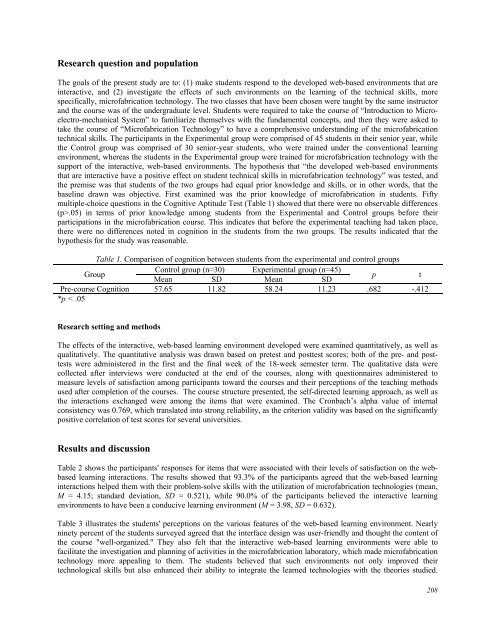Development of a Web-based System to Support Self-Directed ...
Development of a Web-based System to Support Self-Directed ...
Development of a Web-based System to Support Self-Directed ...
Create successful ePaper yourself
Turn your PDF publications into a flip-book with our unique Google optimized e-Paper software.
Research question and population<br />
The goals <strong>of</strong> the present study are <strong>to</strong>: (1) make students respond <strong>to</strong> the developed web-<strong>based</strong> environments that are<br />
interactive, and (2) investigate the effects <strong>of</strong> such environments on the learning <strong>of</strong> the technical skills, more<br />
specifically, micr<strong>of</strong>abrication technology. The two classes that have been chosen were taught by the same instruc<strong>to</strong>r<br />
and the course was <strong>of</strong> the undergraduate level. Students were required <strong>to</strong> take the course <strong>of</strong> “Introduction <strong>to</strong> Micro-<br />
electro-mechanical <strong>System</strong>” <strong>to</strong> familiarize themselves with the fundamental concepts, and then they were asked <strong>to</strong><br />
take the course <strong>of</strong> “Micr<strong>of</strong>abrication Technology” <strong>to</strong> have a comprehensive understanding <strong>of</strong> the micr<strong>of</strong>abrication<br />
technical skills. The participants in the Experimental group were comprised <strong>of</strong> 45 students in their senior year, while<br />
the Control group was comprised <strong>of</strong> 30 senior-year students, who were trained under the conventional learning<br />
environment, whereas the students in the Experimental group were trained for micr<strong>of</strong>abrication technology with the<br />
support <strong>of</strong> the interactive, web-<strong>based</strong> environments. The hypothesis that “the developed web-<strong>based</strong> environments<br />
that are interactive have a positive effect on student technical skills in micr<strong>of</strong>abrication technology” was tested, and<br />
the premise was that students <strong>of</strong> the two groups had equal prior knowledge and skills, or in other words, that the<br />
baseline drawn was objective. First examined was the prior knowledge <strong>of</strong> micr<strong>of</strong>abrication in students. Fifty<br />
multiple-choice questions in the Cognitive Aptitude Test (Table 1) showed that there were no observable differences<br />
(p>.05) in terms <strong>of</strong> prior knowledge among students from the Experimental and Control groups before their<br />
participations in the micr<strong>of</strong>abrication course. This indicates that before the experimental teaching had taken place,<br />
there were no differences noted in cognition in the students from the two groups. The results indicated that the<br />
hypothesis for the study was reasonable.<br />
Table 1. Comparison <strong>of</strong> cognition between students from the experimental and control groups<br />
Group<br />
Control group (n=30)<br />
Mean SD<br />
Experimental group (n=45)<br />
Mean SD<br />
p t<br />
Pre-course Cognition<br />
*p < .05<br />
57.65 11.82 58.24 11.23 .682 -.412<br />
Research setting and methods<br />
The effects <strong>of</strong> the interactive, web-<strong>based</strong> learning environment developed were examined quantitatively, as well as<br />
qualitatively. The quantitative analysis was drawn <strong>based</strong> on pretest and posttest scores; both <strong>of</strong> the pre- and post-<br />
tests were administered in the first and the final week <strong>of</strong> the 18-week semester term. The qualitative data were<br />
collected after interviews were conducted at the end <strong>of</strong> the courses, along with questionnaires administered <strong>to</strong><br />
measure levels <strong>of</strong> satisfaction among participants <strong>to</strong>ward the courses and their perceptions <strong>of</strong> the teaching methods<br />
used after completion <strong>of</strong> the courses. The course structure presented, the self-directed learning approach, as well as<br />
the interactions exchanged were among the items that were examined. The Cronbach’s alpha value <strong>of</strong> internal<br />
consistency was 0.769, which translated in<strong>to</strong> strong reliability, as the criterion validity was <strong>based</strong> on the significantly<br />
positive correlation <strong>of</strong> test scores for several universities.<br />
Results and discussion<br />
Table 2 shows the participants' responses for items that were associated with their levels <strong>of</strong> satisfaction on the web<strong>based</strong><br />
learning interactions. The results showed that 93.3% <strong>of</strong> the participants agreed that the web-<strong>based</strong> learning<br />
interactions helped them with their problem-solve skills with the utilization <strong>of</strong> micr<strong>of</strong>abrication technologies (mean,<br />
M = 4.15; standard deviation, SD = 0.521), while 90.0% <strong>of</strong> the participants believed the interactive learning<br />
environments <strong>to</strong> have been a conducive learning environment (M = 3.98, SD = 0.632).<br />
Table 3 illustrates the students' perceptions on the various features <strong>of</strong> the web-<strong>based</strong> learning environment. Nearly<br />
ninety percent <strong>of</strong> the students surveyed agreed that the interface design was user-friendly and thought the content <strong>of</strong><br />
the course "well-organized." They also felt that the interactive web-<strong>based</strong> learning environments were able <strong>to</strong><br />
facilitate the investigation and planning <strong>of</strong> activities in the micr<strong>of</strong>abrication labora<strong>to</strong>ry, which made micr<strong>of</strong>abrication<br />
technology more appealing <strong>to</strong> them. The students believed that such environments not only improved their<br />
technological skills but also enhanced their ability <strong>to</strong> integrate the learned technologies with the theories studied.<br />
208
















